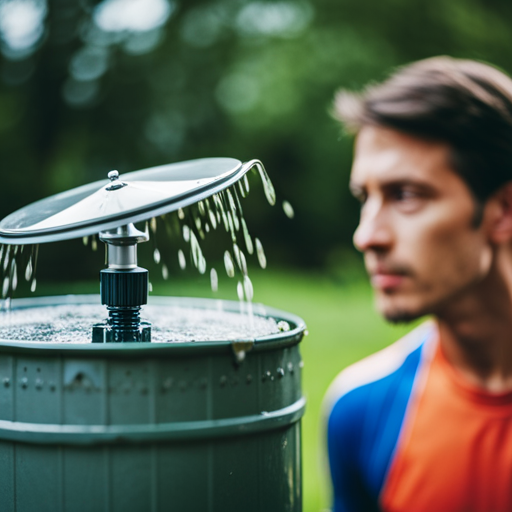If you’re collecting rainwater for drinking or cooking, you may be tempted to use a Brita filter to improve its quality. After all, Brita filters are widely used to purify tap water, so why not use them for rainwater?
However, it’s important to know that Brita filters are not suitable for treating rainwater. In fact, using a Brita filter to purify rainwater could actually put you at risk of illness.
Rainwater is not necessarily clean or safe for consumption. It can be contaminated with a range of pollutants, including bacteria, viruses, chemicals, and heavy metals. While Brita filters can remove some of these contaminants from tap water, they are not designed to effectively remove bacteria, viruses, and other pathogens from water.
This means that using a Brita filter to treat rainwater could leave harmful microorganisms in the water, making it unsafe to drink or use for cooking. In this article, we’ll explore the potential risks of using Brita filters for rainwater and discuss alternative treatment options to ensure the safety of harvested water.
Key Takeaways
– Brita filters are not suitable for purifying rainwater as they are designed to improve the taste and smell of tap water and cannot effectively remove bacteria, viruses, and other waterborne pathogens.
– Rainwater can contain various impurities such as parasites, chemicals, dirt, and viruses, and may not be collected in sanitary ways, making it unsafe to drink without proper treatment.
– Filtration through Brita filters will not remove all the impurities and contaminants present in rainwater, and it should be subjected to appropriate treatment such as boiling, chemical disinfection, and filtration before consumption.
– While some Brita filters such as the Elite Filter and standard pitcher filter can reduce certain impurities in water, they are not certified to remove microplastics, and treated water should always be tested to determine the necessary treatment before drinking it.
Rainwater Contamination
You should be aware that rainwater can be contaminated with pollutants, chemicals, and parasites, and filtering it through a Brita filter will not remove all the impurities.
Rainwater can pick up contaminants and impurities from several sources, including the roof, environment, and catchment tank. The collection process itself may not be done in sanitary ways, and rainwater can even be contaminated before it gets into storage tanks.
Sources of contamination can include dust and chemicals on the roof, bird droppings, and other contaminants that may be present in the environment. Bugs and parasites can also get into the water catchment tank.
Health risks associated with drinking contaminated rainwater can include illnesses such as diarrhea, nausea, and fever. It is important to subject rainwater to appropriate treatment, such as boiling, chemical disinfection, and filtration, before drinking it to ensure that all impurities, including bacteria and viruses, are removed.
Limitations of Brita Filters
The limitations of Brita filters include their inability to purify all impurities and harmful elements in water. While Brita filters are popular for tap water quality concerns, they’re not suitable for purifying rainwater.
Even the most advanced Brita Elite Filter is only certified to reduce certain pollutants, heavy metals, and some pharmaceutical drugs. Brita filters are ineffective when it comes to contaminants such as bacteria, viruses, and other waterborne pathogens.
If you’re looking to purify rainwater for drinking purposes, Brita filters are not the solution. Instead, consider alternative purification methods such as boiling, chemical disinfection, and filtration. Always test the water before drinking it to determine the necessary treatment.
While Brita filters may improve the taste and smell of drinking water, they’re not a substitute for proper water treatment. Filter effectiveness varies depending on the model, and even the most advanced filters won’t remove all impurities or harmful elements in water.
Appropriate Water Treatment
Boiling, chemical disinfection, and filtration are all effective methods for treating water to make it safe for consumption. Boiling water for at least one minute will kill most types of bacteria, viruses, and parasites that may be present. Chemical disinfection using chlorine or iodine can also be effective, but it’s important to follow the recommended dosage and contact time to ensure that all harmful pathogens are eliminated.
It’s important to note that different types of contaminants may require different treatment methods. For example, boiling water will not remove heavy metals or chemicals, which may require filtration or specialized chemical treatment. To determine the appropriate treatment method, it’s essential to test the water to identify the specific contaminants present and their concentrations. This will allow you to select the most effective treatment method and ensure that the water is safe for consumption.
Conclusion
So, there you have it – Brita filters aren’t the solution for purifying rainwater. While they may improve tap water, they can’t effectively remove bacteria, viruses, and other waterborne pathogens that may be present in rainwater.
It’s crucial to ensure that any water collected for consumption is properly treated to avoid potential health risks. Fortunately, there are alternative treatment options available for rainwater harvesting.
These include using UV water purifiers, reverse osmosis systems, and ceramic filters, among others. These methods can effectively remove contaminants and ensure that the collected water is safe for drinking and other household uses.
So, if you’re considering rainwater harvesting, be sure to research and invest in an appropriate water treatment system to protect your health and well-being.
